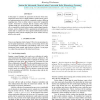Free Online Productivity Tools
i2Speak
i2Symbol
i2OCR
iTex2Img
iWeb2Print
iWeb2Shot
i2Type
iPdf2Split
iPdf2Merge
i2Bopomofo
i2Arabic
i2Style
i2Image
i2PDF
iLatex2Rtf
Sci2ools
123
click to vote
CORR
2011
Springer
2011
Springer
Sampling-rate-aware noise generation
In this paper we consider the generation of discrete white noise. Despite this seems to be a simple problem, common noise generator implementations do not deliver comparable results at different sampling rates. First we define what we mean with “comparable results”. From this we conclude, that the variance of the random variables shall grow proportionally to the sampling rate. Eventually we consider how noise behaves under common signal transformations, such as frequency filters, quantisation and impulse generation and we explore how these signal transformations must be designed in order generate sampling-rate-aware results when applied to white noise.
Related Content
| Added | 13 May 2011 |
| Updated | 13 May 2011 |
| Type | Journal |
| Year | 2011 |
| Where | CORR |
| Authors | Henning Thielemann |
Comments (0)

